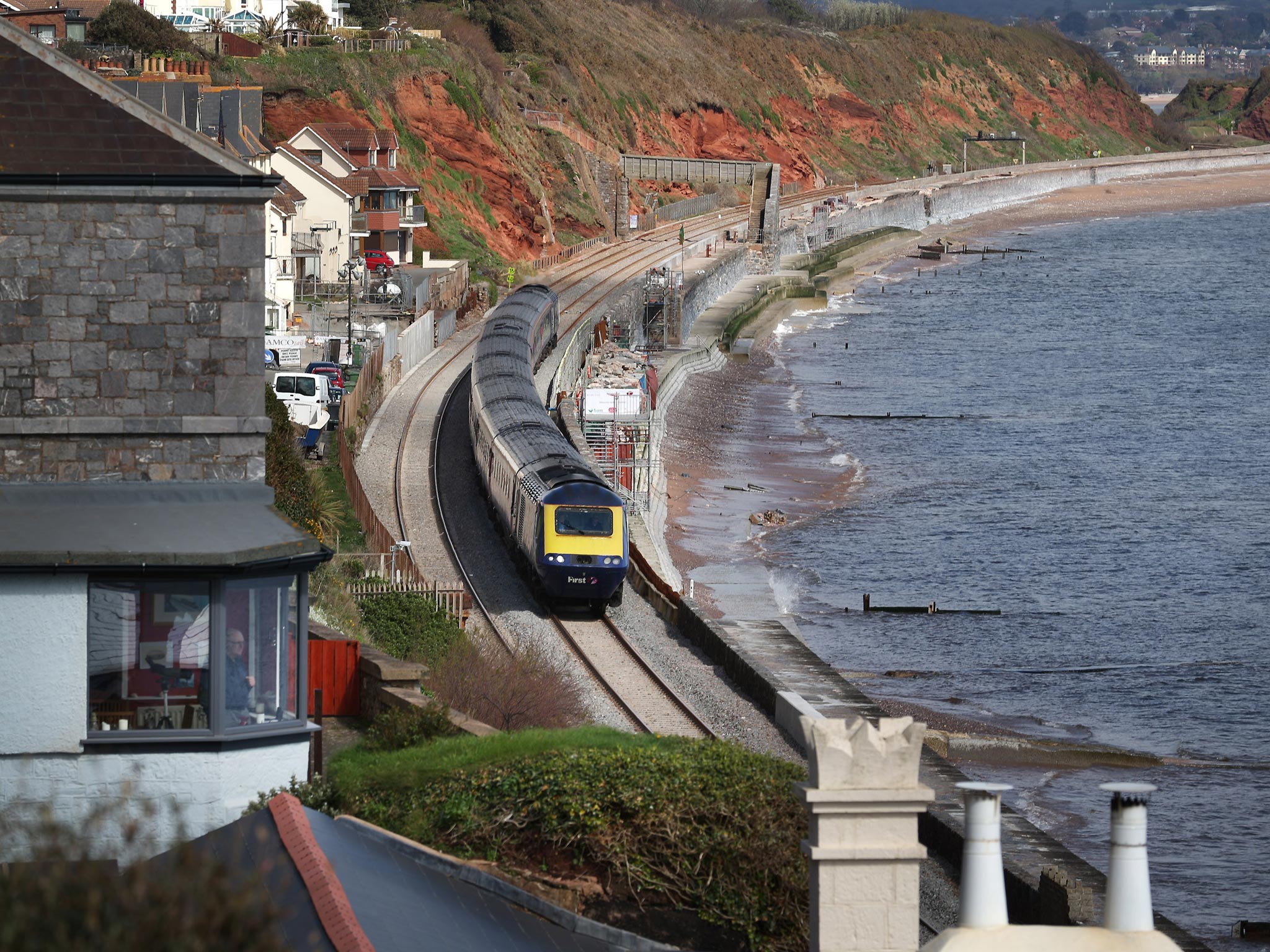Trains are running through Dawlish again – but the replacement bus was quicker
The South-West rail link has been repaired and re-opened but its basic problems remain

“Ladies and gentlemen, the station you’ve all been waiting for,” announced the guard aboard the 5.34am train from Exeter St David’s. “Dawlish will be the next stop.”
Shortly before 6am, I became the first passenger to step off a train at the South Devon station for two months.
The only line between Exeter and Plymouth had been severed in the February storms, obliging passengers to use bus-replacement services.
But the handful of passengers on the first service to run over the restored line were joyful about the return of the train.
“It’s an emotional pull,” said Dave Lovering, an environmental administrator from Exeter. “I’ve grown up with the railways. My father worked on the railways – it’s in the family blood.”
Phil Hoult, a property manager at Exeter University, said: “I met my wife on the platform at Dawlish station. We normally take the train to Dawlish on our anniversary, but we couldn’t this year.”
The first passengers were welcomed by David Crome, general manager west for First Great Western. “We never thought we’d be so happy to see a train come through Dawlish,” he said. “Obviously for our customers it’s been a massive undertaking for the last few months. Now they can start taking the railway for granted, which is what they need to be able to do.”
Isambard Kingdom Brunel’s Great Western line clings to the South Devon shore for four miles between the mouths of the Exe and Teign rivers. At the height of the February storms the sea wall crumbled, leaving the track suspended in mid-air.
Hundreds of Network Rail staff and contractors overcame formidable challenges to repair the track bed and strengthen the sea wall. In total, £15m was spent repairing the area outside Dawlish station where track had been left dangling, with an extra £20m to repair tracks either side of the town.
Speaking in Dawlish hours after the arrival of the first train, David Cameron declared the South-West of England “open for business” again, and praised the people of the town for their “patience and incredible generosity”.
“It’s been a Herculean effort over 56 days and 56 nights. It’s been a huge task,” he said.
But as The Independent revealed a week ago, some trips will actually take longer by train than the bus-replacement services. The first daily departure from London to Truro does not arrive until the afternoon – slower than the temporary bus link via Tiverton Parkway.
Tourism leaders claim that the two-month closure has cost businesses in Devon and Cornwall more than £50m.
Carolyn Custerson of Visit Devon said: “Bookings leading up to Easter are estimated as being 23 per cent down and current reckoning is the crisis has cost the county around £31m.” Malcolm Bell of Visit Cornwall said: “We estimate we’ve lost about £18m. If the railway had stayed closed over Easter, that figure would easily have doubled.”
The closure of the line connecting much of Devon and most of Cornwall with the rest of the country exposed the lack of resilience in the rail network. “There’s a clear need for an alternative all-weather link,” said Mark Smith of Seat61.com, the train travel advice website. “It would not be a replacement for the current line, as the wonderful section of line through Dawlish serves important communities, but an alternative.”
Network Rail is due to report in June on the feasibility of an additional line. The two main proposals are for a new link a short way inland from the existing line, and for the reinstatement of the old Exeter-Plymouth line through Okehampton and Tavistock. The central part of the route, which skirts Dartmoor, was closed in 1968.
Mr Smith said: “Given the extent of the markets which could be served by reinstatement of the old Southern Exeter-Plymouth route under normal circumstances, with its use as a back-up route purely a secondary benefit when problems affect the main line, I’d favour that option.”
The first through service for two months from Plymouth to London Paddington was a 1970s High Speed Train. June Gurry, a passenger from Dawlish, was on board. “In a way, we needed this to show how vulnerable the line is. It’s amazing how quickly they’ve turned it around.” She added that the town had seen “a massive increase in visitors”, as the repair work became a temporary tourist attraction.
But some old problems beset the new stretch of line. The First Great Western express arrived 10 minutes late at Exeter because of “speed restrictions at Dawlish”. Catherine Hayden from Brixham missed her connection to Andover because the service – operated by rival South West Trains – was not held. But she remained positive about the return of rail travel to South Devon. “It’s still better than driving, and I can work on the way.” Then she kindly bought me a cup of tea.
Subscribe to Independent Premium to bookmark this article
Want to bookmark your favourite articles and stories to read or reference later? Start your Independent Premium subscription today.

Join our commenting forum
Join thought-provoking conversations, follow other Independent readers and see their replies